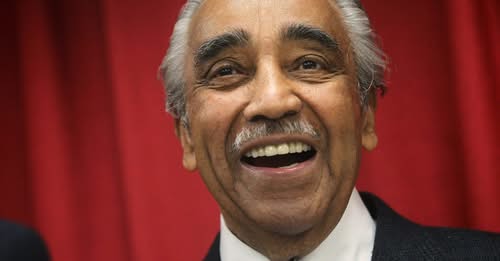🚨 Charles B. Rangel, Trailblazing Harlem Congressman, Decorated War Veteran, Civil Rights Advocate, and First Black Chair of House Ways and Means Committee, Dies at 94 After Seven Decades of Public Service
NEW YORK, May 26, 2025 — Charles Bernard Rangel, a legendary figure in American political history, the first Black chair of the powerful House Ways and Means Committee, and the longest-serving member of Congress from New York, has died at the age of 94. Revered by constituents and colleagues alike as a fierce advocate for Harlem and a powerful voice in civil rights, economic justice, and urban policy, Rangel’s death was announced on Memorial Day by the City College of New York, his alma mater. The cause of death was not immediately disclosed, but the Associated Press confirmed he died in a New York hospital.
Nicknamed the “Lion of Lenox Avenue,” Charles Rangel was a dominant presence in American politics for over four decades, known not only for his booming voice, sharp intellect, and unwavering convictions, but also for his foundational role in shaping policy related to taxation, healthcare, foreign affairs, and veterans’ rights. Rangel’s political career was historic, often groundbreaking, and always anchored in a deep commitment to the community that raised him.
Early Life: From Harlem’s Struggles to Battlefield Bravery
Born on June 11, 1930, in Harlem, New York City, to a working-class family, Charles Bernard Rangel’s early years were marked by hardship and perseverance. His father, Ralph Rangel, abandoned the family, leaving his mother, Blanche Rangel, to raise Charles and his siblings. Despite their limited means, Blanche worked multiple jobs to provide for her children, instilling in them values of discipline, resilience, and education.
Rangel dropped out of high school but later enlisted in the United States Army during the Korean War. There, he would perform the act of heroism that would change his life and foreshadow his commitment to public service. During the infamous Battle of Kunu-ri in 1950, Rangel led fellow soldiers to safety after being trapped behind enemy lines. For his bravery, he was awarded the Bronze Star with Valor, a Purple Heart, and other commendations. He often credited the Army—and the GI Bill—for giving him the chance to turn his life around.
After returning from Korea, Rangel earned his high school diploma, a degree from New York University, and then a law degree from St. John’s University School of Law, all within a decade. His journey from a Harlem dropout to a decorated war hero and lawyer laid the foundation for a public life devoted to empowering the marginalized and advocating for the voiceless.
Rising Through New York Politics: A New Era for Harlem
Charles Rangel’s political career began in the tumultuous 1960s as the civil rights movement reached its peak. He first served as an Assistant U.S. Attorney before turning to electoral politics. In 1970, he defeated longtime Congressman Adam Clayton Powell Jr., a civil rights titan and Harlem icon, in a hotly contested Democratic primary. Though controversial, the victory marked the beginning of a political dynasty and a new chapter in Harlem’s representation.
Rangel would go on to serve 23 consecutive terms in the U.S. House of Representatives, spanning from 1971 to 2017, making him the longest-serving Congressman in New York’s history.
Throughout his career, he never forgot his roots. He remained a fixture in Harlem, holding regular town halls, walking the streets of his district, and hosting annual community events. “All politics is local,” he often said, echoing Tip O’Neill, while never shying away from tackling national and international issues.
Legislative Achievements: A Legacy Written in Policy
Rangel’s legislative impact was both broad and deep. As a founding member of the Congressional Black Caucus (CBC) in 1971, he was a key figure in transforming the body from a symbolic caucus into a powerful voice for African Americans in Congress.
His most significant legislative milestone came in 2007, when he became Chairman of the House Ways and Means Committee, the oldest and one of the most influential committees in Congress, overseeing all taxation, trade, and entitlement programs.
Key areas of impact:
- Tax and Economic Policy: Rangel pushed for progressive tax reforms, including efforts to reduce corporate loopholes, raise taxes on the ultra-wealthy, and expand tax credits for working-class families. He also supported economic empowerment zones to stimulate job creation in underserved communities.
- Healthcare: He was an early and steadfast supporter of universal healthcare, and played a crucial role in the development of legislation that would eventually inform key elements of the Affordable Care Act.
- Foreign Policy and Anti-Apartheid Advocacy: As a senior member of the House Foreign Affairs Committee, Rangel was a prominent critic of apartheid and an advocate for sanctions against South Africa. He also spoke forcefully against U.S. military overreach abroad, most notably the Iraq War.
- Veterans’ Rights: Never forgetting his own service, Rangel was a vocal advocate for veterans, championing improved VA healthcare services, housing programs, and educational opportunities.
- Anti-Drug and Criminal Justice Policy: Rangel took a tough stance on drugs in the 1980s, which later earned criticism for contributing to mass incarceration. However, in later years, he openly acknowledged those consequences and supported criminal justice reform, including marijuana decriminalization and expungement initiatives.
Ethics Controversies and Political Resilience
In 2008, near the height of his influence, Rangel faced a series of ethics investigations related to unpaid taxes and misuse of congressional resources. He was eventually censured by the House in 2010—one of the most serious forms of congressional reprimand.
Though the scandals tarnished his reputation among some, Rangel remained unapologetic in his defense, stating he had made mistakes but never acted with malice or personal greed. His constituents stood by him. He was re-elected in 2010 and again in 2012, a testament to his enduring connection with Harlem.
“I’m not perfect, but I’ve served with love and dedication,” Rangel said in his defense before the House.
Retirement and Continued Influence
Rangel retired in 2017 after 46 years in Congress. He was succeeded by fellow Democrat Adriano Espaillat, marking the first time a Dominican-American was elected to Congress. In retirement, Rangel remained active in public life, lecturing, mentoring younger politicians, and occasionally weighing in on political affairs with characteristic wit and gravitas.
He published an autobiography, “And I Haven’t Had a Bad Day Since: From the Streets of Harlem to the Halls of Congress”, reflecting on his life, triumphs, and regrets.
In 2021, Harlem honored him with the renaming of a section of 125th Street as “Charles B. Rangel Way,” and numerous educational and community institutions bear his name.
Family, Faith, and Personal Life
Rangel was married to Alma Rangel for over 60 years. Together, they had two children. Throughout his career, Alma remained a private but steadfast supporter, often seen by his side at campaign events, official functions, and community gatherings.
A man of deep Catholic faith, Rangel credited his mother and wife for grounding him. His speeches often drew upon biblical imagery and a profound sense of moral duty. He frequently cited his mother’s resilience as the model for his own perseverance.
Tributes Pour In
Following news of his death, tributes poured in from across the political spectrum.
- President of the United States issued a statement calling Rangel “a war hero, a legislative titan, and a relentless fighter for justice whose legacy will live on in the fabric of American law and in the heart of Harlem.”
- Vice President, in a social media post, wrote, “Charles Rangel’s voice roared with truth and passion. His career was an inspiration for generations of Black leaders, including myself.”
- Former President Barack Obama said in a written tribute: “Charles Rangel was a giant. He paved the way for so many of us, and he never forgot where he came from. Harlem and the United States Congress will never be the same without him.”
- House Minority Leader Hakeem Jeffries, who represents another New York district, called Rangel “a father figure, a mentor, and a moral compass for our generation of lawmakers.”
Legacy: A Lion’s Roar Echoes On
Charles B. Rangel’s death marks the end of a storied era not just for Harlem, but for the nation. He was the embodiment of American contradiction and promise—a man who endured systemic racism and personal setbacks but rose to become a symbol of what public service can achieve when rooted in community, principle, and persistence.
Whether fighting in Korea, debating tax policy in Congress, walking the streets of Harlem, or sparring with journalists, Rangel did so with the same energy, humor, and conviction that made him one of the most distinctive voices in modern American politics.
As the city he loved mourns, and as the country reflects, one thing remains certain: the roar of the Lion of Lenox Avenue will be heard for generations.




